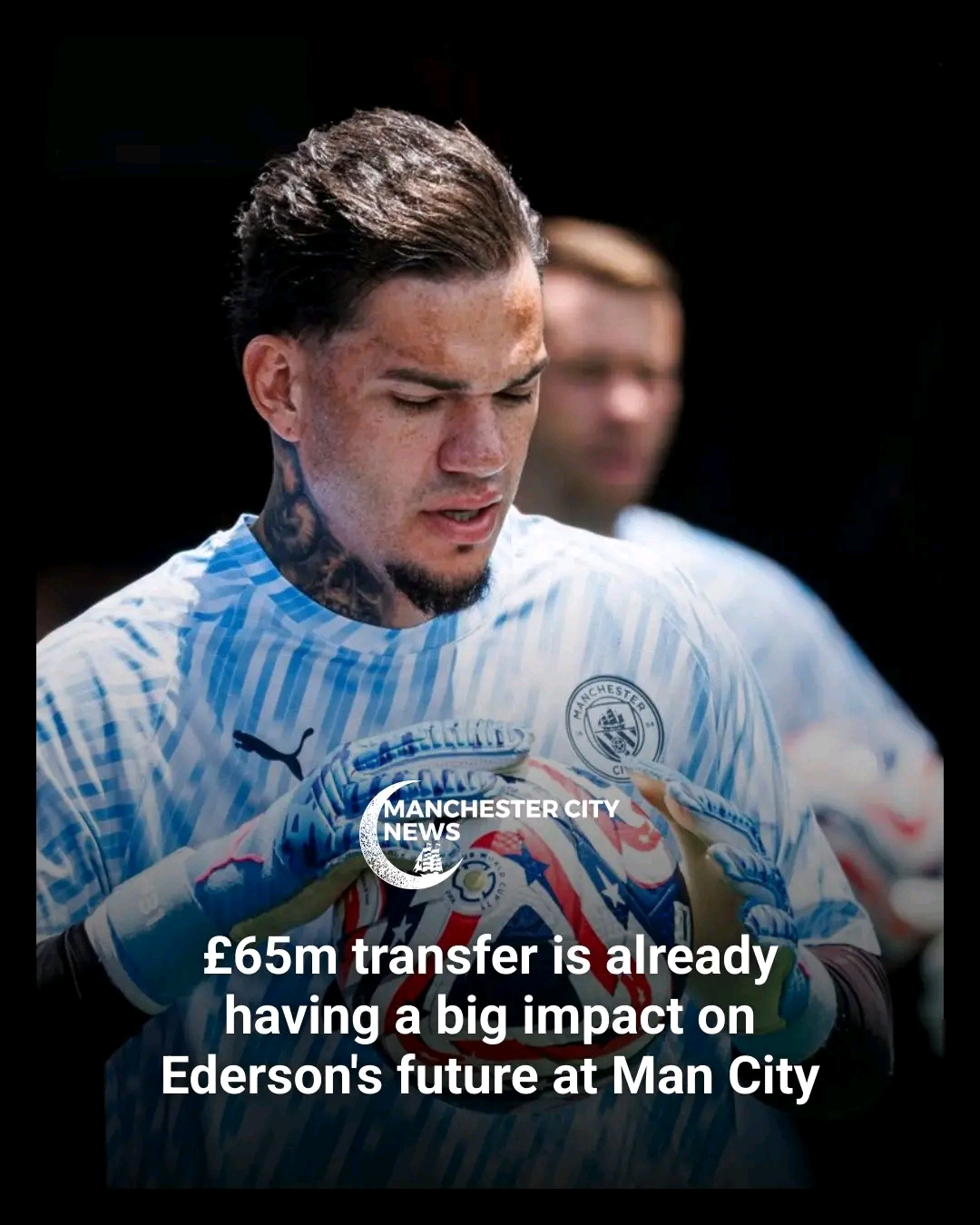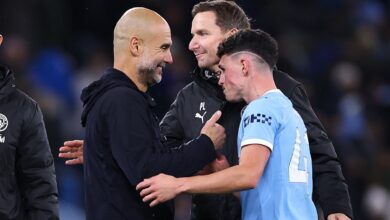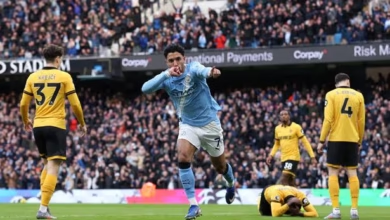Ederson’s Manchester City Future: The Osimhen Domino Effect and Turkish Temptation

Ederson Santana de Moraes stands at one of the most significant junctures of his illustrious career, with his future at Manchester City hanging in the balance despite Pep Guardiola’s public assertions of confidence. The 31-year-old Brazilian goalkeeper, who has been instrumental in City’s unprecedented success over recent seasons, finds himself in the final year of his contract at the Etihad Stadium, a situation that has attracted interest from unexpected quarters and created ripple effects throughout the transfer market.
The goalkeeper’s journey to this crossroads reflects the natural evolution of elite football careers, where contract negotiations, age considerations, and new challenges converge to create moments of potential transition. Ederson’s situation is particularly complex given his integral role in Manchester City’s tactical system, where his distribution skills and sweeper-keeper abilities have revolutionized modern goalkeeping expectations and contributed significantly to the club’s dominance under Guardiola.
Since joining Manchester City from Benfica in 2017 for a then-record fee for a goalkeeper, Ederson has redefined what it means to be a modern keeper. His extraordinary range of passing, combined with traditional shot-stopping excellence, has made him one of the most valuable goalkeepers in world football. His ability to initiate attacks from deep positions has become so integral to City’s playing philosophy that replacing him would require not just finding a quality goalkeeper, but one who can fulfill the unique tactical role he has carved out.
The Brazilian’s contract situation has been brewing for months, with negotiations over an extension appearing to stall despite his continued importance to the team. At 31, Ederson is entering what should be his peak years as a goalkeeper, with the position traditionally allowing for longer careers than outfield players. However, the modern game’s intensity and the specific demands of Guardiola’s system place unique pressures on goalkeepers that may influence career planning and decision-making processes.
Guardiola’s public statement that Ederson will remain for the 2025/26 season represents typical managerial confidence, but the underlying uncertainty surrounding contract negotiations suggests a more complex reality. The Spanish coach’s history with player management indicates he rarely makes such statements without some foundation, yet the ongoing speculation and interest from other clubs suggests the situation remains fluid.
The timing of this contractual uncertainty coincides with Manchester City’s own strategic planning for the future. The club’s long-term succession planning across all positions requires careful consideration of when to invest in replacements versus when to extend existing contracts. Ederson’s age profile and the specialized nature of his role make this decision particularly crucial for the club’s continued success.
Galatasaray’s emergence as serious contenders for Ederson’s signature represents one of the more intriguing developments in this transfer saga. The Turkish giants’ interest in the Brazilian goalkeeper forms part of a broader ambitious recruitment strategy that aims to elevate their status both domestically and in European competitions. Their approach to the summer transfer window demonstrates significant ambition and financial capability that has surprised many observers.
The Istanbul-based club’s initial £2.5 million bid for Ederson, while seemingly modest given the goalkeeper’s quality and importance, reflects both their testing of Manchester City’s position and the financial realities of their current situation. This opening gambit serves multiple purposes: establishing serious intent, gauging City’s willingness to negotiate, and setting preliminary parameters for potential negotiations while preserving resources for other crucial signings.
Galatasaray’s interest in Ederson aligns perfectly with their tactical requirements and ambitions. The Turkish Super League champions recognize that competing effectively in both domestic and European competitions requires not just talent but the kind of specialized skills that Ederson possesses. His distribution ability would be particularly valuable in a league where technical quality can provide significant advantages over physical approaches.
The cultural and professional appeal of Galatasaray should not be underestimated in attracting players of Ederson’s caliber. The club’s passionate fanbase, historic success in European competitions, and position as Turkey’s most internationally recognized football institution provide attractive elements beyond pure financial considerations. For a player potentially seeking new challenges after achieving virtually everything possible at Manchester City, the prospect of leading a resurgent Turkish giant could prove compelling.
However, Galatasaray’s pursuit of Ederson must be viewed within the context of their broader transfer strategy and financial constraints. The Turkish club’s simultaneous interest in multiple Manchester City players suggests either remarkable financial strength or strategic prioritization that will ultimately require difficult choices. Their approach indicates sophisticated planning but also reveals the limitations they face in competing with Europe’s financial powerhouses.
The geographical and cultural factors surrounding a potential move to Turkey add layers of complexity to Ederson’s decision-making process. While Galatasaray offers Champions League football and the opportunity to be a central figure in an ambitious project, the move would represent a significant lifestyle change and potentially limit future options within Europe’s top five leagues.
The £65 million pursuit of Victor Osimhen by Galatasaray has created a domino effect that directly impacts their ability to pursue other targets, including Ederson. This major investment in the Nigerian striker demonstrates both their ambition and the financial constraints that govern even well-resourced clubs in the current transfer market. The structured payment plan for Osimhen, with £35 million paid immediately and £30 million deferred for a year, illustrates creative financial management while revealing budgetary limitations.
Fabrizio Romano’s reporting on the Osimhen deal’s structure provides crucial insight into Galatasaray’s financial position and strategic thinking. The deferred payment arrangement allows them to secure a marquee signing while preserving some immediate liquidity for additional transfers. However, the scale of this investment necessarily limits their ability to pursue multiple expensive targets simultaneously, creating a direct impact on their pursuit of Manchester City players.
The Osimhen signing represents a statement of intent from Galatasaray, signaling their determination to compete at the highest level of European football. The Nigerian international’s proven goal-scoring ability and international profile would provide exactly the kind of impact player that can transform a club’s competitive prospects. However, securing his services effectively prices them out of making comparable investments in other positions.
The timing of the Osimhen negotiations coinciding with their interest in multiple Manchester City players creates strategic complexity for Galatasaray’s recruitment team. They must balance securing their primary target against maintaining flexibility for additional signings that could collectively provide greater overall squad improvement. This decision-making process reveals the harsh financial realities facing even ambitious clubs in the current market.
The structured nature of the Osimhen deal, with penalty clauses preventing sale to Italian clubs for two years, demonstrates sophisticated contract negotiation that protects Galatasaray’s investment while potentially limiting future transfer options. This approach suggests long-term strategic thinking that extends beyond immediate competitive considerations to encompass asset protection and value preservation.
For Ederson and other Manchester City targets, the Osimhen situation creates both urgency and uncertainty. If Galatasaray commit fully to the Nigerian striker, their remaining budget for goalkeeper recruitment becomes severely limited, potentially ending their pursuit of higher-profile targets in favor of more affordable alternatives.
Manchester City’s approach to Ederson’s potential departure reflects sophisticated asset management that balances immediate financial return against strategic squad planning considerations. The club’s previous £40 million valuation, established during last summer’s Saudi Arabian interest, provides a baseline for current negotiations while acknowledging that market conditions and the player’s contractual situation have evolved significantly.
The Premier League champions’ current expectations of £10-20 million for Ederson represent a pragmatic adjustment to market realities while ensuring adequate compensation for losing a key player. This valuation strategy recognizes several factors: Ederson’s age profile, his remaining contract length, the specialized nature of his position, and the current market conditions for elite goalkeepers.
City’s financial position allows them considerable flexibility in handling Ederson’s situation. Unlike clubs facing immediate financial pressure, they can afford to retain the Brazilian even if he enters the final year of his contract, using the season to either negotiate an extension or prepare for his eventual departure with adequate replacement planning. This luxury of time provides significant negotiating power in any potential transfer discussions.
The club’s succession planning for the goalkeeper position has likely been ongoing for months, with recruitment teams identifying potential replacements and monitoring market availability. This preparation allows City to approach Ederson’s situation from a position of strength, knowing they have alternatives identified should negotiations with interested clubs meet their valuation expectations.
Guardiola’s tactical requirements for the goalkeeper position create specific challenges in replacement identification. Finding a player with Ederson’s unique combination of shot-stopping ability, distribution skills, and understanding of City’s complex tactical system severely limits the pool of suitable candidates. This specialization strengthens City’s position in any negotiations, as interested clubs understand the difficulty of replacing such a unique player.
The broader implications of Ederson’s potential departure extend beyond immediate replacement concerns to encompass tactical adjustments and squad harmony considerations. His leadership qualities and relationships with teammates, particularly the Brazilian contingent at the club, add intangible value that transcends pure technical ability. These factors influence City’s decision-making about acceptable offers and timing for any potential departure.
Galatasaray’s ambitious pursuit of multiple Manchester City players simultaneously illustrates both their elevated aspirations and the practical limitations they face in executing such comprehensive recruitment strategies. Their interest in Ederson, Manuel Akanji, and Ilkay Gündoğan represents a dream scenario that would transform their squad quality overnight but requires financial resources that may exceed their current capabilities.
The pursuit of Manuel Akanji adds another dimension to Galatasaray’s recruitment puzzle, with the Swiss defender representing excellent value if available at reasonable cost. Akanji’s versatility and Premier League experience would provide immediate impact, while his age profile suggests several years of peak performance ahead. However, securing his services would require convincing him to accept reduced wages, adding complexity to already challenging negotiations.
The reported agreement of personal terms with Ilkay Gündoğan introduces emotional elements that could prove decisive in Galatasaray’s recruitment efforts. The German midfielder’s childhood support for the Turkish club creates unique motivation that transcends purely financial considerations. This emotional connection could provide Galatasaray with advantages in negotiations that purely financial offers might not achieve.
However, the practical realities of pursuing multiple expensive targets from the same club create logistical and financial challenges that may prove insurmountable. Manchester City would likely prefer to avoid losing multiple experienced players simultaneously, particularly to the same destination, as this could disrupt squad harmony and complicate their own replacement planning.
The interconnected nature of these potential transfers creates a strategic decision point for Galatasaray. Prioritizing one target over others might increase their chances of success while limiting their overall squad improvement. Conversely, attempting to secure multiple players simultaneously risks failing to land any of their preferred targets if resources become overstretched.
The wage demands of Premier League players accustomed to English football’s salary levels present additional obstacles for Galatasaray’s recruitment efforts. Even players willing to consider moves must balance financial considerations against the appeal of new challenges and different competitive environments. These negotiations require delicate balance between club ambition and individual player expectations.
The continued speculation about potential Saudi Arabian interest in Ederson reflects the ongoing influence of the Saudi Pro League in global transfer markets and its particular appeal to players in specific career phases. The financial packages available from Saudi clubs continue to dwarf what most European clubs can offer, creating ongoing uncertainty about player intentions and future destinations.
Ederson’s reported openness to Saudi Arabian opportunities, as mentioned in June reports, demonstrates the compelling nature of these propositions for players approaching their thirties. The combination of extraordinary financial rewards and the opportunity to experience different cultures and football environments creates attractive alternatives to traditional European career paths.
The timing of potential Saudi interest in Ederson could prove crucial in determining his ultimate destination. If Saudi clubs delay their approach until later in the transfer window, it could provide Galatasaray and other interested parties with opportunities to secure his services before more financially attractive offers emerge. Conversely, early Saudi intervention could effectively end other clubs’ hopes of signing the Brazilian.
Manchester City’s previous experience with Saudi interest in Ederson provides valuable insight into handling such situations. The club’s ability to retain the goalkeeper despite substantial offers demonstrates both their financial strength and the player’s professional commitment. However, circumstances change, and what proved decisive previously may not carry the same weight in current negotiations.
The broader implications of Saudi Arabian recruitment strategies extend beyond individual transfers to influence market dynamics and player expectations. The knowledge that extraordinary financial packages remain available creates baseline expectations that affect all subsequent negotiations, even with clubs unable to match such offers.
The cultural and professional considerations surrounding potential moves to Saudi Arabia add complexity to player decision-making processes. While financial incentives may be compelling, factors such as family preferences, career development opportunities, and long-term strategic planning influence final decisions in ways that pure monetary calculations cannot capture.
Pep Guardiola’s tactical system places unique demands on the goalkeeper position that make Ederson’s potential departure particularly challenging from a strategic perspective. The Brazilian’s ability to function as an additional outfield player during possession phases has become so integral to Manchester City’s approach that losing him would require significant tactical adjustments beyond simple personnel replacement.
Ederson’s range of passing and comfort under pressure when receiving back-passes from defenders enables City’s high-line approach and aggressive pressing strategy. His distribution quickly transitions the team from defensive to attacking phases, often catching opponents unprepared for rapid changes in possession. Finding a replacement capable of fulfilling this specialized role represents one of the most challenging recruitment tasks in modern football.
The psychological impact of losing such a key figure extends beyond tactical considerations to encompass team confidence and identity. Ederson’s presence provides reassurance to defenders who can play higher up the pitch knowing their goalkeeper will sweep up behind them effectively. This confidence enables the aggressive defensive positioning that characterizes City’s approach under Guardiola.
Training ground preparation and tactical familiarity represent additional complications in potential goalkeeper changes. Ederson’s understanding of movement patterns, pressing triggers, and distribution preferences has developed over years of working within Guardiola’s system. Replacing this institutional knowledge requires not just finding technically capable players but ones who can quickly assimilate complex tactical concepts.
The manager’s public confidence about Ederson’s future may reflect both genuine belief and strategic communication designed to minimize disruption during a sensitive period. Guardiola’s experience managing high-profile transfer situations provides valuable perspective on maintaining squad focus while handling external speculation and interest.
Alternative tactical approaches that might accommodate different goalkeeper profiles could provide City with contingency planning should Ederson depart. However, such adjustments would require careful implementation to avoid disrupting the established patterns that have contributed to the club’s sustained success under Guardiola’s guidance.
Manchester City’s handling of Ederson’s situation must be viewed within the broader context of Financial Fair Play regulations and their impact on transfer strategy and squad planning. The club’s need to balance expenditure with revenue generation creates considerations that extend beyond pure sporting merit to encompass regulatory compliance and long-term financial sustainability.
The potential transfer fee from Ederson’s departure could provide valuable resources for investment in other areas of the squad or contribute to overall financial balance required by FFP regulations. This economic dimension adds complexity to retention decisions, as clubs must weigh sporting impact against financial opportunity and regulatory requirements.
Ederson’s current wage level and the cost of potential contract extensions must be balanced against alternative uses of those financial resources. The opportunity cost of committing significant funds to goalkeeper retention versus investing in other positions creates strategic decisions that influence overall squad development and competitive capability.
The timing of any potential Ederson departure relative to other transfer activities could impact City’s ability to reinvest proceeds effectively. Early resolution of his situation would provide certainty for planning purposes, while protracted negotiations might limit options for securing preferred replacement targets or making additional squad improvements.
Revenue generation through player sales has become increasingly important for compliance with financial regulations, making strategic departures part of sustainable business models for even the wealthiest clubs. Ederson’s situation provides opportunity for significant revenue generation if handled appropriately, thou















